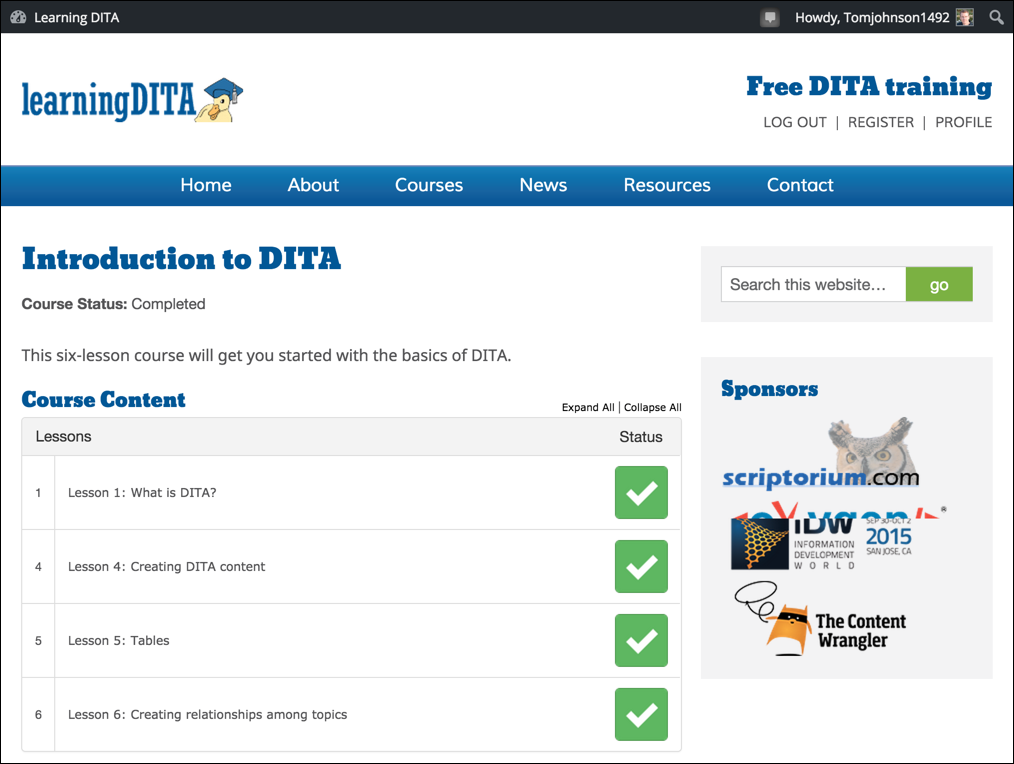LearningDITA.com: A new online learning resource for DITA by Scriptorium
- A Free Course on DITA
- About the course
- Who created the course
- What the course is built on
- Overall feedback
- Why am I reviewing this course?
A Free Course on DITA
One common question I receive from people on this site is how they can learn DITA. Scriptorium has published a new online course (their first, I think) called LearningDITA.com. The first course available is “Introduction to DITA.”

About the course
The course is well-organized and oriented for beginners. Here are some general characteristics of the course:
- The course is primarily text-based, but there are about half a dozen short 1-minute videos peppered throughout. (I could hear Sharon Burton’s voice in the videos.)
- After each lesson, there’s a quiz to test your knowledge. The quizzes aren’t hard, but if you don’t pass, you must retake the quiz in its entirety. (If you get a wrong answer, an explanation of the correct answer appears.)
- There aren’t many mentions of tools, but when there is mention, OxygenXML is noted briefly. (Oxygen is one of the site’s sponsors.)
- There are links to additional learning resources (often to the DITA Style Guide) for each lesson.
- Some of the questions involve drag-and-drop activities to match topics with descriptions. (I liked the interactivity of the drag-and-drop.)
- The course lasts about an hour. Some of the concepts covered include topic types, tables, links, relationship tables, conrefs, and maps.
- When you finish the course, it just shows all modules being complete. (You don’t get a certificate or anything, which is what a lot of new technical writers want.)
Who created the course
Multiple contributors put together the course. From what I could tell, the main contributors included:
- Simon Bate
- Sharon Burton
- Sarah O’Keefe
- Bill Swallow
What the course is built on
The content for learningdita.com was developed using the DITA learning specialization. As explained on the About page:
The content is written in DITA using the DITA learning specialization. LearningDITA.com runs on WordPress; we created XSLT transforms to publish the content here.
It’s interesting to see that Scriptorium created XSLT transforms to publish DITA to WordPress. I think that’s a great example of publishing DITA content.
Overall feedback
My overall feedback about the course is that I thought there should be more hands-on activities. People primarily learn by doing, so there should be more activities that help people create the content talked about in the course.
To credit, there is a lesson that shows how to create a topic in Oxygen, but that’s it. I think there should be a walk-through from beginning-to-end on how to get a simple DITA project authored and published.
Most of the information needed to create a project is provided in the course, more or less, with easy code samples that one could copy and paste. But it would be nice to see an actual step-by-step tutorial for executing a project inside Oxygen or some other tool. Since this is just the “Introduction,” maybe a future course will provide this detail.
Why am I reviewing this course?
If you know me, you may wonder why I’m reviewing a course on DITA, since I abandoned DITA for Jekyll some months ago.
Well, I’m interested in seeing different approaches to online courses and learning. Whereas Peter Gruenbaum’s course on API documentation was primarily video-based, the learningdita.com course is primarily text-based.
Also, I’m trying to highlight more newsworthy events on my blog, and this course on DITA is a first of its kind. Congrats to Scriptorium for making this information available for free on the web.
About Tom Johnson

I'm an API technical writer based in the Seattle area. On this blog, I write about topics related to technical writing and communication — such as software documentation, API documentation, AI, information architecture, content strategy, writing processes, plain language, tech comm careers, and more. Check out my API documentation course if you're looking for more info about documenting APIs. Or see my posts on AI and AI course section for more on the latest in AI and tech comm.
If you're a technical writer and want to keep on top of the latest trends in the tech comm, be sure to subscribe to email updates below. You can also learn more about me or contact me. Finally, note that the opinions I express on my blog are my own points of view, not that of my employer.

